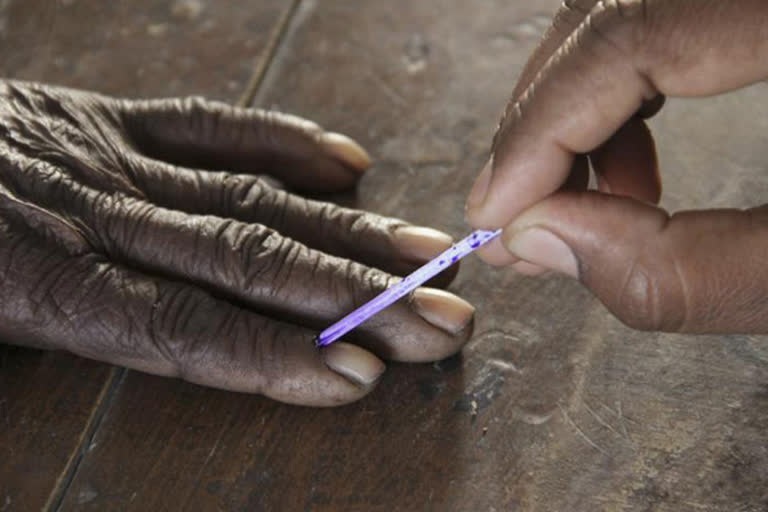Lucknow: Famous Urdu poet Munawwar Rana has declared that he would leave Lucknow if the BJP led by incumbent Chief Minister Yogi Adityanath wins the election to rule the embattled state for the second time. Whether Rana leaves or stays put, his declaration reflects the dilemma of Muslim minority and encompasses the curiosity with which they must be waiting for the final results of the 403-member UP assembly to be declared on March 10.
Muslims, according to a 2011 census, with a headcount of 38,483,967 people, constitute 19.3% of the UP population and their vote can be decisive in around 100 seats. However, despite the sizeable population, the Muslim vote had been rendered ineffective in 2017 elections, which saw the zenith of Prime Minister Narendra Modi's popularity wave.
Interestingly, the rise of the right-wing BJP has its roots in UP. The BJP leadership craftily raised the religious passions to unite a community. This automatically rendered the minority Muslims to margins. "From 2014 to 2019, the people of UP moved to the Hindutva agenda and shed off the caste divisions, which used to be decisive in the previous elections," said Masood ul Hassan, a senior journalist in Lucknow.
"This time around, the caste factor has staged a comeback. This makes the Muslim vote again countable and decisive," he said.
He laments that despite being a sizable minority, the political representation of Muslims has always been low. Barring the exceptional poll results in 2002, when 64 Muslim candidates were successful--the highest number ever--the Muslim representation has been meagre. In the outgoing assembly elected in 2017, only 23 Muslim legislators were Muslims.
Political analysts say that Samajwadi Party has emerged as the primary choice for Muslim voters. The party in alliance with Rashtriya Lok Dal, Suhail Deo Bharatiya Samaj Party, Mahan Dal, Pragati Sheel Samaj Party and Janwadi Party are challenging the BJP, which became quite attractive for the Muslim voters.
Senior journalist Zaid Ahmad Farooqi says that in the current Assembly elections, Muslims have voted for a united socialist alliance for a number of reasons. The first reason is that in the previous elections, Muslims used to vote for the winning candidate other than the BJP, regardless of which party they belonged to. But this time they have voted in the name of the Samajwadi Party.
Political experts also believe that the Samajwadi Party did not give tickets to Muslims in proportion to the population and in most of the assembly constituencies from which Muslim candidates were fielded, Akhilesh Yadav himself did not go for campaigning. This has never happened before. Earlier, during the election campaign, prominent Muslim faces like jailed Azam Khan or late Ahmed Hassan were proactive in the campaigning.
Interestingly, Azam Khan's son Abdullah Azam, who was bailed out during the elections and contested from Swar constituency maintained a low-key and did not venture out of the confines of his turf. This was to give an impression that the elections are not fought on a communal agenda. Less Muslim candidates and equally fewer Muslim campaigners was an announcement that the BSP is far more concerned about the majority community.
The contrast was visible in rival Bahujan Samaj Party (BSP) which had fielded around 100 Muslim candidates in 2017. The party repeated the number but this time it did not go unnoticed. From day one, it was presumed that fielding a bulk of Muslim candidates is only to divide the community's vote. The BSP is considered a natural ally to BJP should the latter fall short of numbers to form a government.
The entry of All India Majlis-e-Ittehad-e-Muslimeen (AIMIM) is a much-talked-about factor in the UP polls. Barrister Asaduddin Owaisi led AIMIM has national aspirations to claim representation of Muslims. Owaisi got bouquets and brickbats for his decision to enter into the poll fray as his critics opined that his entry would further divide the Muslim vote. An influential Muslim scholar, Maulana Sajjad Nomani wrote an open letter to Owaisi to desist from fielding a bulk of candidates and instead advised him to field his candidates only on winnable seats. This was a bit of advice for tactical voting and fielding of candidates. Though Owaisi did not pay heed to the advice, observers say that Muslim voters have largely taken the point. Observers say that barring his party's edge over three seats, the AIMIM candidates are unlikely to make any difference at other places.
Whatever way the UP results go, the verdict will have a huge impact on the peace, stability, and future of the minority Muslim community.


